by Seth J. Frantzman
Iraq is one of Iran’s last allies in the region, and Iran wants to show its clout in Iraq and pressure Baghdad.
 |
The Iranian head of the Islamic Revolutionary Guard Corps Quds Force, Esmail Qaani, travelled to Iraq this week. He is arriving in Baghdad ahead of an Arab summit. Iraq is one of Iran’s last allies in the region, and Iran wants to show its clout in Iraq and pressure Baghdad.
The arrival of Qaani coincides with Iranian pressure on Iraq to crack down on dissident groups that oppose the Iranian regime. It also comes as Iraq’s Prime Minister Shia al-Sudani met with key Iranian-linked leaders in Iran, including Hadi al-Amiri and Qais Khazali.
Qaani likely recalls that his predecessor, Qasem Soleimani, was killed by a drone strike ordered by US President Donald Trump in January 2020. Trump is still in the region while Qaani is in Baghdad. The National in the UAE noted that the “rare publicly announced visit comes days before the Arab Summit in Baghdad.”
The report in The National said that “the visit was announced by Iraqi National Security Adviser Qasim Al Araji, who met Mr Qaani in Baghdad. He said they discussed ‘joint efforts to secure the borders and the implementation of the security agreement between the two countries.’”
Iran is pressuring Iraq to crack down on Kurdish groups. "In March 2023, Tehran and Baghdad signed a security agreement after launching air strikes against bases of Iranian Kurdish opposition groups. They have since agreed to disarm them and remove them from border areas,” the report said.


According to the report, Araji and Qaani discussed the Iran deal talks that the US and Iran are engaged in. “We emphasised the importance of the success of negotiations between Washington and Tehran and the commitment of all parties to dialogue and calm to achieve stability in the region,” Araji said.
Iraqi Prime Minister Mohammed Shia al-Sudani affirmed on Thursday that his government is proceeding with establishing the state's monopoly on arms and rejecting the presence of any weapons outside its official institutions, Shafaq News reported in Iraq. “He emphasized that this approach represents one of the fundamental pillars of strengthening the state's prestige and stability.”
In an interview with Sky News Arabia, Al-Sudani said, "The duality of arms does not align with the concept of the state…We have confronted terrorism for two decades, and today we are working to strengthen our security institutions through a legal, political, and security.”
Iraq has a large number of Iranian-backed militias called the Population Mobilization Units. However, these groups include militias who conduct attacks targeting Israel and also targeting US forces. Iraq has tried to rein them in. It’s complex because they are both official state paramilitaries, like a national guard, and also operate as independent militias. Some of them, such as Kataib Hezbollah and Asaib Ahl al-Haq, are sanctioned by the US.
An informed source told Shafaq News that Qaani is focused on files in Iraq, “most notably his country's desire for Arab support to lift the siege on it, and to include its demands in the official agenda of the Arab Summit, which will be held in a few days.” The source told Shafaq News Agency, "One of the most important issues that Qaani discussed with National Security Advisor Qasim al-Araji was the joint border security issue between the two countries, specifically the mechanism for implementing the provisions of the security agreement concluded between Baghdad and Tehran in 2023."
The source added, "Qaani will discuss the Iranian-American negotiations with Baghdad and will also hold meetings with leaders of the [pro-Iran Shi’ite] Coordination Framework, possibly one-on-one, to brief them on all the details and information regarding the course of the negotiations between his country and the United States, in addition to other information regarding these agreements and their impact on the security and stability of the region."
Meanwhile, Muqtada al-Sadr, a cleric and political leader, rejected what he calls the “Abrahamic Religions project.” This is apparently a reference to the coexistence concepts advocated in the Gulf in the context of the Abraham Accords.
Meanwhile, Iraq’s prime minister met with Amiri, the powerful leader of the Badr militias, and Khazali, the head of Asaib Ahl al-Haq. ‘The meeting reviewed Iraq's readiness to host the Arab Summit and its parallel summits, emphasizing the importance of holding them in Baghdad and the significance this represents in terms of Iraq regaining its pivotal role at the Arab and regional levels,”
This summit represents an important step towards strengthening Iraq's relations
Iraq’s Prime Minister's Office said, "During the meeting, the most important developments and preparations for the Arab Summit in Baghdad were reviewed. This summit represents an important step towards strengthening Iraq's relations and coordinating positions on current issues and challenges, particularly in light of Iraq's growing pivotal role in its Arab and regional environment.”
Iraq appears to be ignoring Trump’s visit to the region. Trump is supposed to go to the UAE and then may go to Turkey. Iraq, where US forces are based and which was a center of US policy during the 1990s and 2000s, is now an afterthought, apparently.
The pro-Iran axis in Iraq has opposed Syria’s president attending the Arab summit in Baghdad. Damascus will apparently send its foreign minister. According to Arab News on Thursday, Trump will address US troops at the Al Udeid Air Base on May 15 in Qatar before heading to the UAE.
Seth J. Frantzman
Source: https://www.jpost.com/middle-east/iran-news/article-854081
No comments:
Post a Comment